
Four biomedical engineering professors in Vanderbilt’s School of Engineering have been elected into the American Institute for Medical and Biological Engineering’s (AIMBE) College of Fellows.
AIMBE Fellows will induct the 2014 class of fellows in a ceremony at the National Academy of Sciences Monday, March 24, during the organization’s winter meeting, which is held annually in Washington, D.C.
Associate Professor Bruce M. Damon, Professor Mark D. Does, Professor Michael I. Miga, and Ingram Associate Professor of Cancer Research Thomas E. Yankeelov are recognized for exceptional leadership and achievements in medical and biological engineering.
“It is a high honor to be elected by peers to the AIMBE’s College of Fellows; the most accomplished and distinguished leaders in the fields of medical and biological engineering. This achievement is even more significant this year since AIBME had the largest number of candidates nominated, the most rigorous subcommittee review process, and the highest percent successfully elected,” said Milan P. Yager, AIMBE executive director. About 1,500 individuals comprise the College of Fellows.
Recipients of this honor, considered one of the highest in the biomedical engineering discipline, represent the top 2 percent of the medical and biological engineering community. Their contributions impact biomedical devices and processes, treatment of diseases and public policy related to all aspects of bioengineering.
Damon develops more detailed and quantitative magnetic resonance imaging (MRI) methods for characterizing muscle damage related to diseases, and specifically related to muscular dystrophy. He received a bachelor of science in exercise science at the University of Massachusetts, and a master of science in kinesiology from the University of Illinois. He has a doctorate in molecular and integrative physiology from the University of Illinois.
Does uses a variety of experimental MRI and nuclear magnetic resonance (NMR) protocols, signal analysis methods, and computational modeling to characterize specific characteristics of tissue, such as myelin thickness in white matter, myofiber size and density in skeletal muscle, or pore and bound water concentrations in bone. Does received a bachelor of science and a master of science in electrical engineering, and a doctorate in biomedical engineering from the University of Alberta.
Miga, director of the Biomedical Modeling Laboratory, develops new paradigms in detection, diagnosis and treatment of disease through the integration of computational models into research and clinical practices. He received a bachelor of science and a master of science in mechanical engineering at the University of Rhode Island. He has a doctorate in biomedical engineering from Dartmouth College.
Yankeelov, director of Cancer Imaging Research at VUIIS, develops advanced imaging methods for the characterization of human tumors and to evaluate their role as potential surrogate biomarkers of treatment responses and tissue status for use in clinical trials and drug discovery. Yankeelov received a bachelor of arts in mathematics at the University of Louisville. He received a master of arts in applied mathematics and a master of science in physics at Indiana University. He has a doctorate in biomedical engineering from the State University of New York, Stony Brook.
All four professors hold faculty positions in the Department of Radiology and Radiological Sciences in Vanderbilt’s School of Medicine. Damon, Does and Yankeelov also are core members of the Vanderbilt University Institute of Imaging Science. The VUIIS is a multidisciplinary institute drawing from the School of Engineering, the School of Medicine and the College of Arts and Science.
AIMBE’s 2014 Annual Meeting of the College of Fellows, March 23-25, will focus on the role of engineering in the future of individualized health care. Session topics will include functional mapping of the human brain and new technologies that are revolutionizing individualized medicine. Critical issues associated with the legal and ethical aspects of these advancements will be examined. Additional sessions will focus on increasing the role of diversity and on the young innovators in engineering who are emerging as the next generation of leaders.